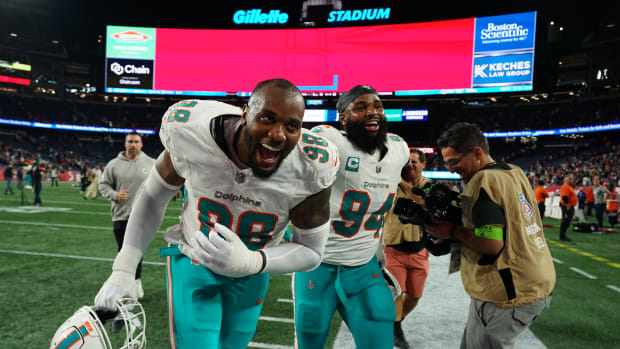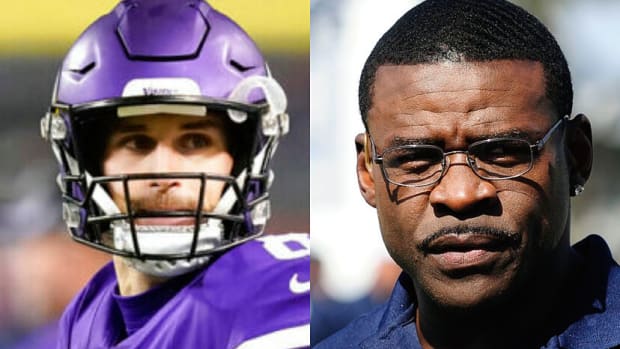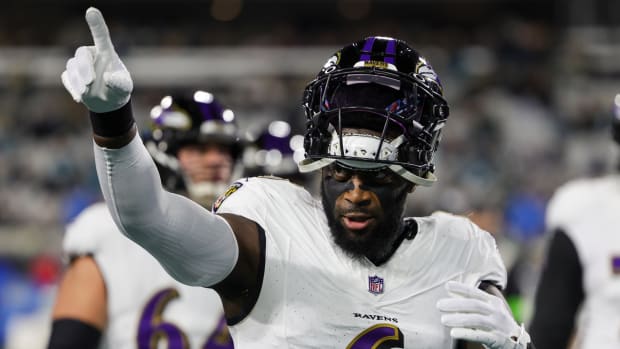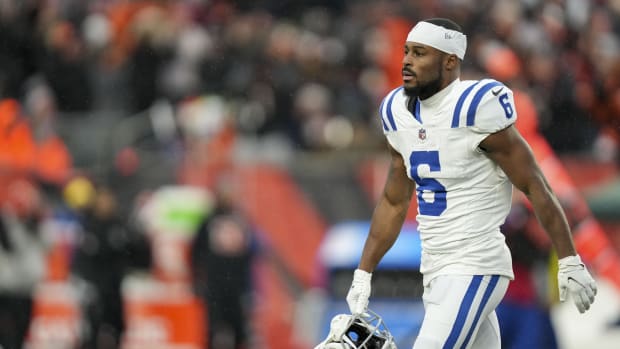How the NFL Has a Softer Salary Cap Than the NBA
Before getting to the column, a word about another role I’ve recently added: I have joined renowned entrepreneur Gary Vaynerchuk and his talented brother AJ to become Executive Vice President of Vayner Sports.
I had received several inquiries about joining sports agencies over the years, offered everything from being a one-time consultant to becoming their full-time President/CEO. I always resisted, feeling “been there, done that” about the agent business. When approached with this, however, it offered something different.
On the sports side, I will mentor the young agents—including Brandon Parker, son of the great, agent Eugene Parker, who passed away a couple of years ago and who mentored me even from the other side of the table. And I will lend my experience and expertise to certain recruitments and negotiations. But beyond the sports side I will be involved in the branding side as well, tapping into Gary’s expansive audience with new opportunities including speaking engagements, entrepreneurial and corporate gatherings, expanded audio and visual content and more. No other “agent” could offer me these opportunities; it is a partnership that made obvious sense.
To be clear, my role with Vayner will not affect the other faucets I have running. I will continue to serve in my “day job” running the Moorad Center for the Study of Sports Law at Villanova Law School, as well as writing this regular column and hosting my weekly podcast The Business of Sports with Andrew Brandt. And, of course, I continue my adherence to my fitness and the racing that I do, as well as my most important job: being a father to two wonderful sons. As I often say, “I have a lot of jobs so I don’t have to have a real one.”
Now on to the column…
Although this space is reserved for the business of football, it is an interesting time to compare and contrast it with the business of basketball, where an extraordinary number of A-list NBA players now are free to choose their team in free agency. Their decisions will affect not only their current and future teams but also the entire league. The business of NBA free agency is in stark contrast with the business of NFL free agency, where we rarely see even one superstar come free and reap those benefits, despite spending advantages (yes, advantages) that NFL teams have over NBA teams. Let’s examine.
NBA stars go free; NFL stars do not
The top of the 2019 NBA free agent class includes Kawhi Leonard, Kevin Durant, Klay Thompson, Kyrie Irving, Kemba Walker, DeAngelo Russell, Jimmy Butler, Tobias Harris and Kris Middleton. The top of the 2019 NFL free agent class included Le’Veon Bell (who had one team interested, the Jets), Tyrann Mathieu (released by the Texans), Earl Thomas (unwanted by the Seahawks), Trey Flowers, Landon Collins, ZaDarius Smith and Trent Brown. The contrast between the two lists is stark, with many of the top players in NFL free agency unwanted by their incumbent teams.
True NBA superstars almost always reach the free marketplace; true NFL superstars almost never do. Why? Well, NFL teams are smart, both collectively through CBA negotiations and individually through player contract negotiations. Collectively the NFL has negotiated a way to keep most of the labor force relatively underpaid, with rookies signing mandatory four-year fixed and undervalued rookie contracts, with no ability to renegotiate for three years. By the time a player is eligible for his second contract, he has been underpaid for three years, often with roughly $1 million scheduled for his fourth year in the league. That is when NFL teams pounce to secure players long-term on contracts that are one-way (for the team) past the early, low-risk years. How do I know? I see it all the time and well, I was the one pouncing in the past.
And if a player does get close to free agency? Well, the NFL has an effective tool to blunt that: the franchise tag. Teams not only apply the tag to those who make it to free agency—this year’s crop included Jadaveon Clowney, Frank Clark and DeMarcus Lawrence—but implicitly raise the threat of the tag often in negotiations with elite players. NFL owners are not going to give this up in CBA negotiations; and NBA players will never accept this in theirs.
Thus, there have been few true NFL stars to reach free agency since the first free agent some 26 years ago, Reggie White. The closest case most recently may be Kirk Cousins last year (if you call him a star) and only because his incumbent team, Washington, never offered him a serious contract. Peyton Manning was a free agent in 2012, cut by the Colts after three neck surgeries. Drew Brees was a free agent in 2006, also coming off a significant injury. There are other examples like Deion Sanders and Charles Woodson (who I signed in Green Bay after noticing his soft market), but there aren’t many.
And, as we have seen, star quarterbacks approaching free agency never reach the finish line. Aaron Rodgers and Carson Wentz recently re-upped with the Packers and Eagles with two years left on their deals. Matt Ryan and Russell Wilson got closer, only one season away, but the Falcons and Seahawks eventually locked them up. As for the next crop of star quarterbacks—Patrick Mahomes, Dak Prescott, Jared Goff, etc.—chances are they will sign lucrative deals, but never get near the pot of gold that is true free agency.
NBA stars, with no franchise tag to restrain them after contract expiration, usually resist early team overtures, knowing the leverage of free agency will only strengthen their bargaining power. NFL stars simply can’t wait, only entering free agency if allowed to, as players like Bell, Cousins, Mathieu and Thomas know. And NFL teams know it.
Hard cap? No, a yarmulke
Let’s debunk the myth about the NFL having a “hard cap” and the NBA having a soft one. Both are soft, and the NFL cap is even softer (a yarmulke, as I say).
Yes, the NBA cap allows exceptions that give teams flexibility to exceed the cap: Bird rights, midlevel exceptions, etc. But the NFL has a much simpler way for teams to exceed the cap: the proration of signing bonuses, allowing teams to spend cash while spreading cap over the life of contracts and renegotiations. To clarify: NFL teams can spend well above the cap on a year-to-year basis while staying under it. That, my friends, is a soft cap.
For example, Aaron Rodgers’s extension with the Packers—which included a $57.5 million signing bonus—included a 2018 cap number of $21 million and a 2018 cash number of…$67 million. That $46 million difference in cash over cap—for just one player—shows how NFL teams can go “over the cap” from a cash spending point of view. And the Packers spent roughly $205 million last season on a cap of $177 million. With this ability to go tens of millions of dollars over the cap number on one player, there is nothing “hard” about the NFL salary cap.
Furthermore, NBA teams have three restrictions that NFL team do not: (1) maximum contracts, (2) a luxury tax, and (3) no ability to roll over cap from year to year. Maximum contracts limit the earning power of the most elite players, and the luxury tax—while not prohibiting teams from overspending—has a deterrent effect that NBA owners mention frequently in their spending decisions. As to cap rollover from one year to the next, NFL teams can bring unused cap room forward to the next season; NBA teams do not have that luxury (and most teams spend all their cap room anyway).
The NFL, of course, has no maximum contracts, no luxury taxes and unlimited cap carryover from year to year. I know this flies in the face of the common narrative, but the NFL has a softer cap than the NBA.
The response ahead
When the dramatic numbers on NBA free agent contracts are revealed next week, the annual ritual will ensue of NFL players and media acting aghast at the numbers and, more importantly, the guarantees. Here are my thoughts on this predictable reaction.
NFL free agents—such as Flowers and Collins this year—do receive striking total contract values of $80 million or even more. The difference from NBA contracts, of course, is in the quality of the money, not the quantity. The $80 million in an NBA contract is secure; the $80 million in an NFL deal is not. It’s more like “$30-40 million, and we’ll see.” For example, one of this year’s free agents, new Eagle Malik Jackson, once signed one of those $80 million free agent contracts with the Jaguars. He signed an $85.5 million deal for six years that turned out worth about half of that, around $43 million, before he was released.
With CBA negotiations approaching, many suggested that guaranteed contracts should be a priority for the NFLPA to change, but this is not a CBA issue. There is nothing in the NBA CBA requiring guaranteed contracts, and there is nothing in the NFL CBA limiting guaranteed contracts.
This is not to say that the NFLPA, along with individual agents for NFL players with extreme leverage, cannot negotiate to change the paradigm. On the collective front—as I have pointed out numerous times—the NFLPA can attempt to negotiate more stringent team spending minimums, both in percentage (above the present threshold of 89% of the cap) and accounting frequency (more often than the present four-year windows). Were the union able to negotiate, say, minimum team spending of 95% of the cap with accounting every two seasons, team spending and guarantees would necessarily rise dramatically. The union could also negotiate some teeth into the cap carryover rules, forcing teams to “use it or lose it” much more than they have (10 teams rolled over more than $10 million into this year, led by the Browns carrying over $56 million in unused cap room). As for individual negotiations, agents for superstars need to resist early overtures—as Cousins did—in order to break team precedents on spending and guarantees.
I realize these are tough asks of the NFLPA and agents but they are the answers the question I hear so often of: “Why can’t NFL players get guaranteed contracts?”
Yes, NBA stars, with fewer players and more games, have more impact than NFL stars (although debatable with star quarterbacks). But do not kid yourself: NFL teams can guarantee more and spend more with a soft cap and a system with no maximum contracts, no luxury taxes and free cap rollover year to year.
They just don’t want you to know that.
• Question or comment? Email us at talkback@themmqb.com.




































